With the rapidly changing international political scene, and President-elect Donald Trump to enter the White House on Jan. 20, uncertainty over continued U.S. support for Ukraine in the face of Russian aggression has never been higher.
So the need for Ukraine to become more self-reliant in matters of defense was the key theme of the Security and Defense panel at the 5th annual Tiger Conference, organized by the Kyiv Post on Nov. 29 in the Hilton Kyiv Hotel.
“In the current situation, we have only one plan,” Ihor Dolhov, Ukraine’s deputy defense minister said during the discussion. “To develop our armed forces. To be strong. To transform and improve our defense industry. By doing so we will be able to protect our future.”
Dolhov said Russia currently has 55,000 troops stationed near the Ukrainian border and between 5,000 and 7,500 in the east of Ukraine. The official told the conference that in spite of a great deal of effort on Ukraine’s part to find a political solution to the conflict with Russia, militant attacks and Ukrainian casualties are recorded on a daily basis in Ukraine’s Donbas.
The Kremlin denies sending troops, weapons and ammunition into Ukraine to foment conflict, but the evidence is undeniable.
Dolhov emphasized that a decision by the International Criminal Court to designate Russia’s war on Ukraine as an international armed conflict and not a civil war only confirms what Ukraine has long told the world – that it is under attack from its aggressive neighbor.
Meanwhile, Ukraine has only received foreign military aid in the form of some equipment, ammunition and training from its allies, although it has asked to be sent weapons to help defend the country from Russian forces and Russian-backed armed groups in the Donbas. The requests have so far gone unanswered, however.
NATO membership also remains an aim of the current Ukrainian administration. The goal for the armed forces is to reach the standards of the military alliance by 2020, although panelist Andreas Umland argued that as long as the war with Russia continues, there will always be member states ready to veto Ukraine’s accession.
“Ukraine will only have a chance to enter NATO when it does not need NATO that much anymore,” Umland said. “This talk of NATO rapprochement distracts from the real, hard security issues. It’s a distraction from the actual problems we face here.”
The head of NATO representation in Ukraine, Alexander Vinnikov, reinforced the message that the country must take matters into its own hands. “Our message has always been that NATO is here to help,” he told the Kyiv Post in an interview. “But ultimately it’s Ukraine’s responsibility to take forward reforms to enhance its own capacity to defend itself.”
The fact that Ukraine must now be prepared to continue fighting without help from the international community was further brought into focus by another panelist, Russian military expert Pavel Felgenhauer. He predicted that a permanent solution to the Ukraine-Russia conflict was unlikely to be found, and went as far as to suggest that the Normandy Format talks, which involve Ukraine, Russia, France and Germany, are essentially at a dead end.
“I don’t believe there can be serious progress in the Normandy format,” Felgenhauer said. “The war isn’t stopping. For Russia, Ukraine becoming in any way a part of Europe and the West is seen as totally unacceptable. Which means that the Russian military will continue to prepare capabilities, in case there is a need to use force.”
Felgenhauer also revealed that Russia has a secret strategic defense plan, which predicts that world war is inevitable and could come as soon as 2025, as nation-states clash over natural resources such as oil and gas.
Ivanna Klympush-Tsintsadze, Ukrainian vice prime minister for for European and Euro-Atlantic integration, picked up the thread of the Russian threat, and issued a warning call to the West. She argued the international community would be wise to help Ukraine in its current confrontation with the Kremlin, as the country “is a very important target for the Russian Federation.”
“It would be a terrible mistake for the civilized world not to react to that accordingly,” she said, “because it’s not about Ukraine, it’s about Russia’s war against the democratic world.”
The democratic world, however, now finds itself at an important juncture, said Erik Brattberg, owing to the coming arrival in the White House of Trump.
“If Hillary Clinton had been elected we would be having a very different conversation,” said Brattberg, an international affairs analyst based in Washington, D.C.
“The conversation would have been about continuity, perhaps even a more forward-leaning, ambitious U.S. foreign policy towards Ukraine and towards Russia. What we’re facing now with Trump is primarily uncertainty. We don’t necessarily know what’s coming.”
However, the future for Ukraine under a Trump presidency could still be bright. Not only because the nation still enjoys a great deal of bipartisan support in the U.S. Congress, but also because campaign rhetoric deployed by the Republican businessman, including that he might recognize Russia’s illegal annexation of Crimea, are unlikely to translate into concrete action, Brattberg said.
Such statements “should be taken with a grain of salt,” according to Brattberg. “These were things that he said to a domestic audience in the U.S. to connect with his voters emotionally.”
But Rasa Juknevičienė, a Lithuanian lawmaker and former defense minister, added that if Ukraine is to prosper in the coming years, large-scale reforms will still be needed. Such changes are prerequisites if the country if to realize its hopes of one day joining international bodies, she said.
“It must be done step-by-step. There needs at least to be a strategy to have Ukraine in the European Union in future,” she said, adding that having a clear understanding that Lithuania would join the EU helped the nation to drive through reforms.
Juknevičienė also praised Ukrainian army’s effort in defending not only the country’s east, but the whole Europe and took hard line against Russia.
“It’s important for Europe to have a stable and democratic Ukraine (which is) not a part of the Russian Empire,” Jukneviciene said during the discussion. If Europe doesn’t want to live next to an “unpredictable Russian Empire,” she adds, it must understand the role of Ukraine.
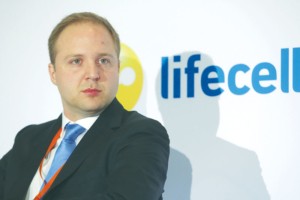
“Why is it in the United States’ interest to help Ukraine? If you can make that argument and make it credibly, I think you can actually find some people in the Trump White House paying attention to you.”
– Erik Brattberg,
McCain Institute for International Leadership. (Kostyantyn Chernichkin)
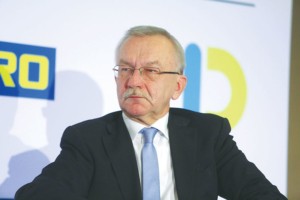
“We have no grounds to expect any significant changes in the Russian hybrid policy. In the current situation, we have only one plan. To develop our armed forces. To be strong.”
– Ihor Dolhov, deputy Ukrainian defense minister for international integration (Kostyantyn Chernichkin)
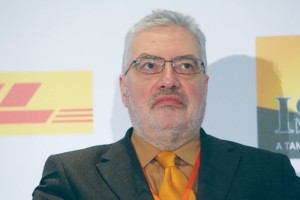
“No permanent solution is in sight to the Ukraine-Russia conflict, but there’s the possibility that things could get worse.”
– Pavel Felgenhauer Russian military analyst (Kostyantyn Chernichkin)
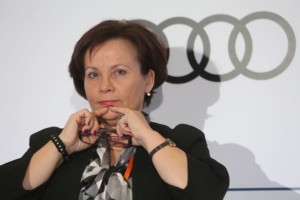
“The boys in eastern Ukraine are dying defending Europe. Europe needs to wake up and change the mindset. It needs Ukraine more than Ukraine needs Europe.”
– Rasa Juknevičienė,
member of Lithuanian parliament and former defense minister (Kostyantyn Chernichkin)
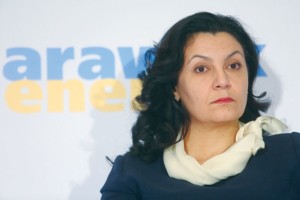
“Ukraine is (not) the only object of attack of the Russian Federation … But it is a very important target for the Russian Federation and it would be a terrible mistake for the civilized world not to react to that.”
– Ivanna Klympush-Tsintsadze, Ukrainian deputy prime minister (Kostyantyn Chernichkin)
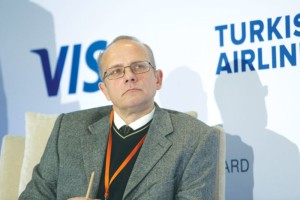
“Ukraine will only have a chance to enter NATO when it does not need NATO that much anymore. This talk of NATO rapprochement distracts from the real, hard security issues. It’s a distraction from the actual problems we face here.”
– Andreas Umland, Institute for Euro-Atlantic Cooperation (Kostyantyn Chernichkin)
